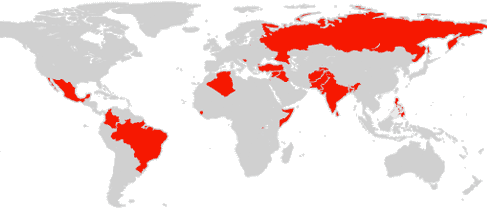Prime Minister Nawaz Sharif won general elections in May, though the vote was marred by violence, including bomb blasts targeting polling stations. The Pakistani media’s nonstop election coverage made news organizations full-fledged partners in the democratic process, intrinsic to the first civilian transfer of power after the completion of a five-year term by a democratically elected government. At least five journalists were killed this year–fewer than in 2012. One was a targeted killing. CPJ continues to investigate the killings of three other journalists in unclear circumstances, two of whom were Baluch. Legislative action stemming from a March conference on the U.N. Plan of Action on the Safety of Journalists and the Issue of Impunity had yet to materialize, though the government repeated its commitment to enacting legislation. Three correspondents–from The New York Times, The Hindu, and Press Trust of India–were expelled from Pakistan in 2013. The Hindu and PTI were eventually allowed to replace their staff members.
Pakistan
» Nawaz Sharif comes to power in first peaceful government transition.
» Five journalists killed in relation to their work.
Prime Minister Nawaz Sharif won general elections in May, though the vote was marred by violence, including bomb blasts targeting polling stations. The Pakistani media’s nonstop election coverage made news organizations full-fledged partners in the democratic process, intrinsic to the first civilian transfer of power after the completion of a five-year term by a democratically elected government. At least five journalists were killed this year–fewer than in 2012. One was a targeted killing. CPJ continues to investigate the killings of three other journalists in unclear circumstances, two of whom were Baluch. Legislative action stemming from a March conference on the U.N. Plan of Action on the Safety of Journalists and the Issue of Impunity had yet to materialize, though the government repeated its commitment to enacting legislation. Three correspondents–from The New York Times, The Hindu, and Press Trust of India–were expelled from Pakistan in 2013. The Hindu and PTI were eventually allowed to replace their staff members.
Although the number of killings declined from previous years, the country remained one of the world's deadliest for the press.
With 53 work-related fatalities, Pakistan is the world's sixth-deadliest nation for the press since 1992, CPJ research shows.
Eighteen other journalists have been killed under unclear circumstances in Pakistan since 1992. CPJ is investigating to determine if the killings were related to their work.

| 1. Iraq: 161 2. Philippines: 76 3. Syria: 61 4. Algeria: 60 5. Russia: 56 6. Pakistan: 53 7. Somalia: 52 | 8. Colombia: 45 9. India: 32 10. Mexico: 29 11. Brazil: 27 12. Afghanistan: 24 13. Turkey: 21 14. Sri Lanka: 19 | 15. Bosnia: 19 16. Rwanda: 17 17. Tajikistan: 17 18. Sierra Leone: 16 19. Bangladesh: 14 20. Israel and the Occupied Palestinian Territory: 12 |
The May 2013 election of Prime Minister Nawaz Sharif was the first time a government has transitioned through the electoral process. Other civilian leaders had been ousted or assassinated.
Political reporting has proven to be the most dangerous field to cover--small wonder, seeing that there have been three periods of military rule since independence on August 14, 1947.
| 60% | Politics |
| 40% | War |
| 25% | Crime |
| 13% | Human Rights |
| 13% | Corruption |
| 6% | Business |
| 4% | Culture |
*May add up to more than 100 percent because more than one category applies in some cases.
International journalists generally escape the wrath of the Pakistani government, and few have been expelled over the years. But in 2013, journalists from three international outlets--The New York Times, The Hindu, and Press Trust of India--were sent home, according to reports.
The Hindu and Press Trust of India were allowed to replace their correspondents.
The New York Times: | Declan Walsh was forced to leave in May on 72 hours' notice. |
The Hindu: | Anita Joshua was denied a visa extension and left in June. |
Press Trust of India: | Rezaul Hasan Laskar was denied a visa extension and left in June. |
The Hindu: | Meena Menon arrived in July. |
Press Trust of India: | Snehesh Alex Philip arrived in July. |
